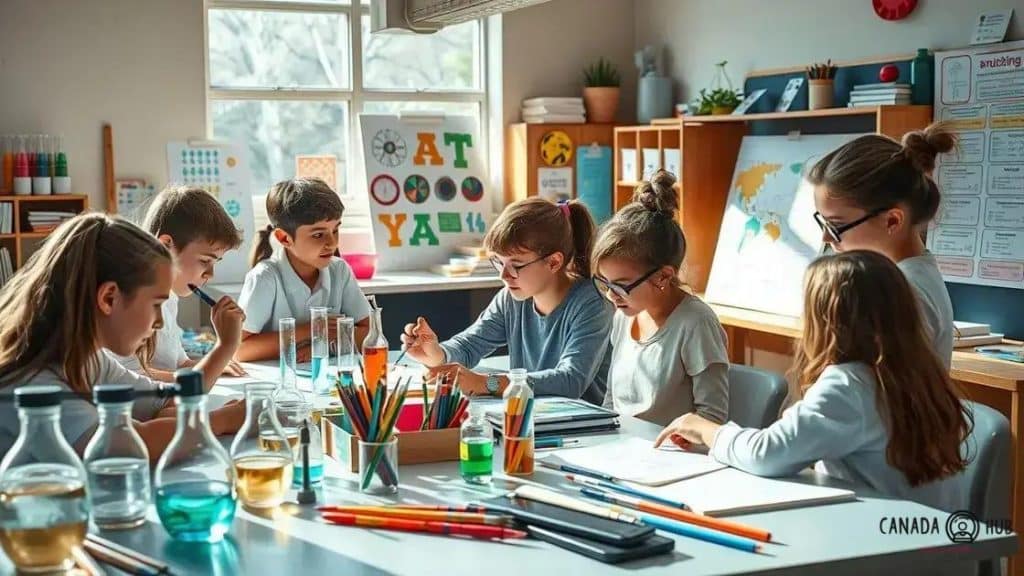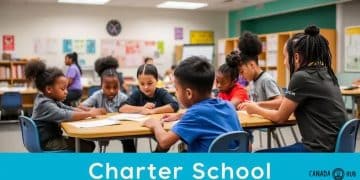School districts eliminate standardized testing practices

School districts eliminate standardized testing practices to enhance student engagement, promote creativity, and focus on holistic learning through alternative assessment methods like project-based learning and portfolios.
School districts eliminate standardized testing practices is a bold move that could reshape the landscape of education. Have you ever wondered how this affects students and teachers alike? Let’s dive into the details.
Reasons behind the movement
Understanding the reasons behind the movement to eliminate standardized testing is crucial for grasping its implications in education. As schools evolve, educators and policymakers are reevaluating the effectiveness of these tests.
Quality of Education
Many argue that standardized tests do not truly reflect a student’s knowledge or abilities. They often focus narrowly on specific subjects, which can limit a student’s overall learning experience.
Moreover, the pressure of testing can impact student mental health and motivation. The quest for a well-rounded education has prompted schools to seek alternatives to these high-stakes assessments.
Equity and Fairness
Standardized testing has come under scrutiny regarding fairness. Students from different backgrounds may not have equal access to resources and preparation, leading to disparities in test scores.
- Socioeconomic factors influence preparation opportunities.
- Cultural biases may exist in test questions.
- Some students perform better in hands-on, project-based assessments.
Addressing these inequities is a significant motivator for schools to consider new evaluation methods.
Focus on Holistic Assessment
Shifting towards holistic assessment means looking at the whole student. This approach values teamwork, creativity, and critical thinking alongside traditional academic skills.
Schools recognize that preparing students for a complex world requires a broader skill set. This rethinking of evaluation methods reflects a lasting change in educational philosophy.
Alternative assessment methods
When schools move away from standardized testing, they explore various alternative assessment methods to better evaluate student learning. These methods provide a more comprehensive view of a student’s abilities.
Project-Based Learning
One effective alternative is project-based learning. In this approach, students engage in real-world projects that require critical thinking and collaboration. Rather than taking a test, they demonstrate their knowledge through presentations and creative work.
- Encourages creativity and innovation.
- Promotes teamwork and communication skills.
- Allows for practical application of knowledge.
Students often find this method more engaging as they work on topics they are passionate about.
Portfolios
Another popular method is the use of portfolios. Students collect their work over time, showcasing their progress and achievements. This format allows educators to see a broader range of skills and talents.
Portfolios might include written assignments, art projects, and even video presentations, all demonstrating different aspects of learning.
Performance-Based Assessment
Performance-based assessments require students to perform tasks that demonstrate their knowledge. For instance, this could be conducting a science experiment or giving a verbal history presentation.
These assessments not only test knowledge but also how well students can apply what they have learned in practical situations. This approach better prepares students for future challenges, reinforcing that learning is not just about memorizing facts.
Impact on teacher evaluations
The shift away from standardized testing has significant impact on teacher evaluations. As schools adopt new assessment methods, the way educators are evaluated is also changing.
New Criteria for Evaluation
With alternative assessments, schools are looking for different metrics to judge teacher performance. Instead of relying solely on student test scores, evaluations now often consider classroom engagement and student growth over time.
- Teacher contributions to project-based learning.
- Effectiveness in facilitating group work.
- Feedback from students and peers.
This broader perspective helps highlight the various ways teachers support learning beyond just preparing students for tests.
Professional Development Opportunities
As evaluations change, there’s also a greater emphasis on continuous improvement. Teachers are encouraged to participate in professional development programs that focus on new teaching methods and assessment strategies.
Schools may provide resources for teachers to learn how to incorporate hands-on activities and collaborative projects into their curriculum. These opportunities not only enhance teaching skills but also boost teacher morale.
Reflecting on Teacher Success
Alternative assessment methods give a more comprehensive view of teacher success. Rather than focusing solely on student outcomes, evaluations consider how teachers foster an inclusive and engaging learning environment.
By celebrating various achievements, schools create a culture of support that fosters both student and teacher growth. This holistic approach is essential as we move towards a more balanced educational system.
Student reactions to changes
Understanding student reactions to changes in assessment methods is essential for schools transitioning away from standardized testing. These changes can significantly impact how students feel about learning and their performance.
Initial Responses
When schools first announce the end of standardized tests, students often feel a mixture of excitement and uncertainty. Many express relief at not having to take high-stakes exams. This feeling can foster a more positive attitude towards learning.
- Increased enthusiasm for classroom activities.
- More willingness to engage in creative projects.
- Reduced anxiety about performance.
However, some students may also worry about how their skills will be evaluated in the future and whether their efforts will be recognized.
Adapting to New Assessments
As students adapt to alternative assessment methods, such as project-based learning and portfolios, their reactions continue to evolve. Many students find these methods more engaging because they allow for personal interests and creativity.
Students appreciate being part of the assessment process and having a voice in how they showcase their knowledge. This approach often boosts their confidence and motivation to learn.
Feedback on Changes
Student feedback on new assessment techniques is crucial. Many express that they feel more motivated when learning is hands-on and relevant to their lives. Feedback can be gathered through surveys or class discussions, providing valuable insights into how to improve the learning experience further.
Students commonly report feeling more ownership over their education, which can enhance their overall academic performance. In this way, understanding student reactions plays a vital role in shaping effective educational practices.
Future of education without standardized tests
The future of education without standardized tests looks promising and dynamic. As schools embrace new assessment methods, they are changing how education is perceived and delivered.
Shifting Educational Focus
Education is moving from a test-centric model to a more holistic approach. This shift encourages creativity, critical thinking, and individual growth. Students are becoming more engaged in their learning processes, often exploring subjects that interest them.
- Emphasis on real-world skills.
- Increased collaboration among students.
- Development of problem-solving abilities.
This new focus allows learners to connect knowledge to real-life situations, promoting deeper understanding.
Adopting Technology and Innovation
The absence of standardized tests leads to greater innovation in teaching methods. Educators can utilize technology in more meaningful ways, integrating online resources and interactive tools.
For example, virtual classrooms and educational apps provide personalized learning experiences, allowing students to progress at their own pace. This tailored approach meets diverse learning needs and promotes inclusivity in education.
Fostering Lifelong Learning
Without the pressure of standardized tests, students may develop a love for learning that extends beyond the classroom. Emphasizing exploration and discovery helps cultivate curiosity.
Schools that embrace this model actively encourage students to pursue interests and continually seek knowledge throughout their lives. This shift prepares learners for a world that values adaptability and lifelong learning.
FAQ – Frequently Asked Questions about the Future of Education without Standardized Testing
What are the main benefits of moving away from standardized testing?
The main benefits include fostering creativity, critical thinking, and reducing test-related anxiety for students.
How will new assessment methods impact students’ learning?
New assessment methods promote hands-on projects and real-world applications, making learning more relevant and engaging for students.
What role does technology play in the future of education?
Technology enhances personalized learning experiences, allowing students to progress at their own pace and engage with educational content interactively.
How can schools support teachers during this transition?
Schools can provide professional development opportunities and resources to help teachers implement new teaching methods effectively.





